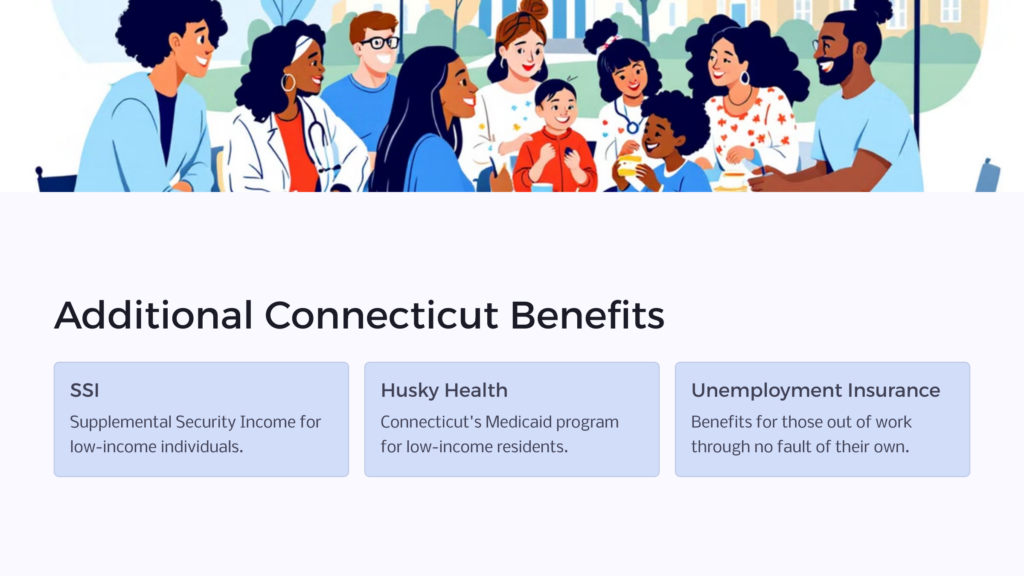SSDI benefits can help Connecticut residents who have a long-term disability that prevents them from working for at least 12 months.
Typically, an SSDI application will only be approved if the claimant has paid a significant amount of Social Security taxes through employee payroll deductions.
Facts About Connecticut

Approximately one in four adults across the US has a disability, according to the CDC. In the Constitution State, that ratio is lower, with one in every five. The Land of Steady Habits (as it’s also called) seems to be aptly named since disabled Connecticut residents are significantly less likely to be obese, smoke, inactive, or have high blood pressure than disabled Americans across the country.
But even though a disabled Connecticut resident is more likely to be healthy than the national average, disabilities can still make life financially challenging. Thankfully, SSDI benefits can help defray expenses like housing, food, and transportation.
How To Qualify for SSDI in Connecticut

If you hope to qualify for Connecticut Social Security disability, you will need to show the SSA that you are a qualified person medically and non-medically. The non-medical qualification relates to how many work credits you have attained through employment, where you paid Social Security taxes (also called FICA taxes).
$1,470 in net earnings gives you one work credit, and the most you can attain per year is four. You will need 40 to qualify for the disability program, and 20 of those credits must be from the past decade.
The medical component of your disability application must prove that you have a qualified disease or condition that debilitates you for at least 12 months or will eventually result in death. Sometimes, a disability claim will be fast-tracked if the disease is on the list of Compassionate Allowances, such as fast-moving cancers.
To qualify for Social Security disability benefits, your disability application will need to contain sufficient proof of this condition such as medical records, letters from doctors, and hospital bills. Sometimes, it helps to seek out legal advice from a Social Security disability lawyer who can assist you in packaging your disability claim in the most convincing way.
As many as 70% of SSDI claims are turned away initially. In addition to improving your chances with your disability claim at the outset, an SSDI lawyer can help you see if another route like workers’ compensation would behoove you more, or if you should pursue a disability hearing.
How To Apply for SSDI in Connecticut

A Connecticut resident with an SSDI claim needs to show the Disability Determination Service that they are medically and non-medically qualified. Non-medical qualification means you have paid enough Social Security taxes. The medical qualification is determined if an eligible applicant has an SSA-approved condition like a particular developmental disability or mental illness.
There are hundreds of different disabilities listed in the SSA Blue Book, but even if you do not have a specific disability, you can show that your Residual Functional Capacity (RFC) is too low to retain any gainful employment.
If these two components are in place and you have your medical records in order, you can apply online right on the Social Security Administration website, or over the phone at 800-772-1213. You could also go into one of the 15 Social Security office locations around the Nutmeg State.
How To Appeal a Denial in Connecticut
If the SSA does not approve your SSDI application, you can go through the process of Disability Adjudication with Disability Determination Services. The first course of action is to request a reconsideration so you can provide more evidence, whether that is medical documentation to build a case for your disability, or documents relating to how much Social Security tax you paid throughout your employment or self-employment history.
If the reconsideration does not go as hoped, you can request a hearing in front of an Administrative Law Judge, who may return your application to a different disability examiner.
The next level of appeal is the Appeals Council, which may return your case to a different ALJ or decide it themselves. Unfortunately, many SSDI applications need to go through disability adjudication. One way to reduce this likelihood is to get a disability lawyer in The Nutmeg State to assist with your claim.
More Connecticut Benefits

SSI
If someone does not have sufficient work history to qualify for SSDI, they may be able to obtain Supplemental Security Income (SSI), which is a similar program with some key differences in terms of eligibility and monthly benefit.
Supplemental Security Insurance is available for low-income earners who are disabled, blind, or over the age of 65. The maximum amount of SSI an individual can collect is $794 for an individual and $1,191 for an eligible couple – so note that separate SSI benefits do not necessarily combine into a larger total. However, there is no work credit requirement for SSI.
Even if you do qualify for SSDI, you may be able to collect SSI as well, which not only can increase your income by $794, but can also make sure you have no gaps in medical coverage, because it takes two years for Medicare to kick in with SSDI, and SSI recipients get medical assistance right away.
Connecticut Medicaid
Husky Health is the Connecticut Medicaid program. Medicaid is a government program jointly funded and administered by the federal and state governments to provide low-income earners with health insurance. In Connecticut, Husky Health has different parts (A, B, C, and D), each one applicable to a different demographic. For example, Husky D is for low-income earners with dependents.
Connecticut Unemployment Insurance
There are also Connecticut Unemployment benefits, which are paid through the Connecticut Department of Revenue Services. These unemployment benefits are available to those who are out of work through no fault of their own, available to work, and seeking unemployment.
Note that “no fault” according to Connecticut Law does not necessarily preclude collecting unemployment if you were terminated against your will unless you engaged in willful misconduct.
Connecticut Social Security Offices
| SSA Field Office Locations in Connecticut | ||
| Hartford SSA Office | 960 Main St 2nd Floor Hartford, CT 6103 | (877) 619-2851 |
| Bridgeport SSA Office | 35 Courtland St 2nd Floor Bridgeport, CT 6604 | (866) 331-6399 |
| Waterbury SSA Office | 51 North Elm St Suite 1 Waterbury, CT 6702 | (877) 405-4874 |
| Willimantic SSA Office | 1320 Main St Ste 19 Willimantic, CT 6226 | (877) 405-0488 |
| New London SSA Office | 2 Shaws Cove Rm 101 New London, CT 6320 | (866) 643-3401 |
| New Haven SSA Office | 150 Court St Giaimo Fed Bldg 4th Fl New Haven, CT 6510 | (866) 331-5281 |
| New Britain SSA Office | 233 Main Street 2nd Fl New Britain, CT 6051 | (866) 858-6086 |
| Stamford SSA Office | 2 Landmark Square Suite 105 Stamford, CT 6901 | (866) 770-1881 |
| Meriden SSA Office | 321 Research Pkwy Suite 212 Meriden, CT 6450 | (877) 409-8429 |
| Torrington SSA Office | 147 Litchfield Street Torrington, CT 6790 | (877) 405-0486 |
| Danbury SSA Office | 131 West St Danbury, CT 6810 | (866) 275-7821 |
| Ansonia SSA Office | 475 Main Street Ansonia, CT 6401 | (866) 331-7096 |
| East Hartford SSA Office | 478 Burnside Avenue East Hartford, CT 6108 | (866) 706-6759 |
| Middletown SSA Office | 425 Main Street 3rd Floor Middletown, CT 6457 | (877) 692-3145 |
| Norwich SSA Office | 55 Main St Suite 380 Norwich, CT 6360 | (888) 482-3170 |
Connecticut Hearing and Appeal Offices
Connecticut is in Region 1 (Boston), which services Connecticut, Maine, Massachusetts, New Hampshire, Rhode Island, and Vermont.
| Region 1 – SSA Office of Hearing Operations in Connecticut | ||
| SSA Hearing Office – Hartford | 135 High Street, Room 331 William R. Cotter Federal Building Hartford, CT 06103-1193 | (866) 931-2878 |
| SSA Hearing Office – New Haven | 157 Church Street, 7th Floor Connecticut Financial Center New Haven, CT 6510 | (866) 613-2750 |
 Benefits.com Advisors
Benefits.com Advisors
With expertise spanning local, state, and federal benefit programs, our team is dedicated to guiding individuals towards the perfect program tailored to their unique circumstances.
Rise to the top with Peak Benefits!
Join our Peak Benefits Newsletter for the latest news, resources, and offers on all things government benefits.



















